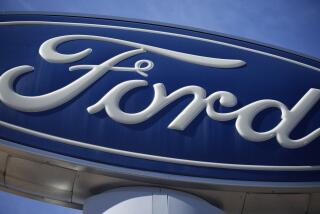Supercharging a Technology
- Share via
Imagine the fortune in being the first in the world to develop practical, affordable vehicles powered by clean technology. Auto makers are becoming aware of the enormous payoff potential and working harder to develop alternatives to internal combustion engines.
Ford Motor Co., together with Germany’s Daimler-Benz and a small Canadian manufacturer, has now placed a huge bet on fuel cell technology. Fuel cells, which create electricity by electrochemically combining hydrogen and oxygen, are the latest turn in the international derby among auto makers to take the lead in “green cars.” Last week’s global warming agreement in Kyoto, Japan, is putting more pressure on industrialized nations to reduce tailpipe pollution. And other U.S. states are following the lead of California, which will require car companies to sell a certain number of zero-emission vehicles by 2003.
The auto makers, while resisting regulation, have one by one or jointly worked to develop clean vehicles, mostly battery-operated. But General Motors’ EV1 electric car has not attracted many leasers, despite a hefty subsidy, because of its limited range and need for frequent recharging. Toyota is just beginning to sell a more practical hybrid car in Japan that runs primarily on batteries but can be switched to a small gasoline engine.
Ford’s decision to invest $420 million in an existing alliance between Daimler-Benz and Ballard Power Systems, a Vancouver maker of automotive fuel cells, could significantly push forward fuel cells as an alternative technology. The main obstacles have been cost and the technical problem of which source--methanol, gasoline or something else--would be the best source of hydrogen. The new venture is expected to gain federal regulatory approval within a few months.
Hiroshi Okuda, the president of Toyota Motor Co., has predicted a “paradigm shift” to greener automobiles, and Japan’s efforts have provided a competitive boost. U.S. auto makers have not generally embraced environmental innovation unless forced to do so by government regulators. Ford’s welcome entry into fuel cell development may spur U.S. innovation and market competition for clean cars.






